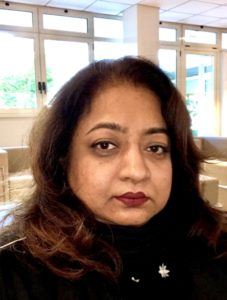“CDAIS has enhanced my functional skills in networking, communicating, negotiating at global, country, organizational and cluster levels and I have learnt a lot about Monitoring, Evaluation and Learning. I believe this exposure will help me in my future efforts and I am grateful to CDAIS for giving me the confidence to make a bigger contribution to the development of my country.”
Hello, who are you?
I am Rozana Wahab, lead National Innovation Facilitator. I have an MBA with a major in marketing. I am an entrepreneur and a development expert. I have worked as a programme manager in the EU Bangladesh Delegation where I gained experience of planning and management of EU programmes in collaboration with international organizations and development partners. I have designed and implemented programmes related to polices, national quality infrastructure and quality management systems for shrimp exports, agribusiness (horticulture), and geographical indication studies. I have experience of managing EU bi-lateral and multilateral programme funds and managing regional and global funds. I took early retirement from the EU in 2011 and worked in my own business. I set up a self-sustaining business model and had free time to look for opportunities.
What are your roles and responsibilities as National Innovation Facilitator?
My role in the project is to lead CDAIS activities related to monitoring, evaluation and learning (MEL) and implementing the Coaching Plan at both organizational and cluster levels, as well as project management, logistics and managing Agrinatura funds. I ensure facilitative learning takes place for achieving project’s aims of improving functional capacity development through learning cycle activities.
What has CDAIS changed for you?
I participated in the NIF training in October 2016 and started my first assignment in November. This NIF training exposed me to various learning tools which I was able to use in the five capacity needs assessments studies. I learnt to engage participants to identify problems and do joint visioning and action planning to solve problems as innovation partnerships. I had opportunities to write stories and present Bangladesh through the poster presentation at an international meeting in Laos in September 2017. Participation in these meetings and training sessions increased my knowledge and understanding of the overall project. Although I have worked on soft skills development with business managers and technical workers over an extended period, I found that the approach used in CDAIS is a mind-opener. At the MEL training in Montpellier, France I observed that this approach combines flexible tools at distinct stages of the learning cycle and this seemed very relevant. CDAIS has given me the opportunity to work in development from a distinctive perspective.

